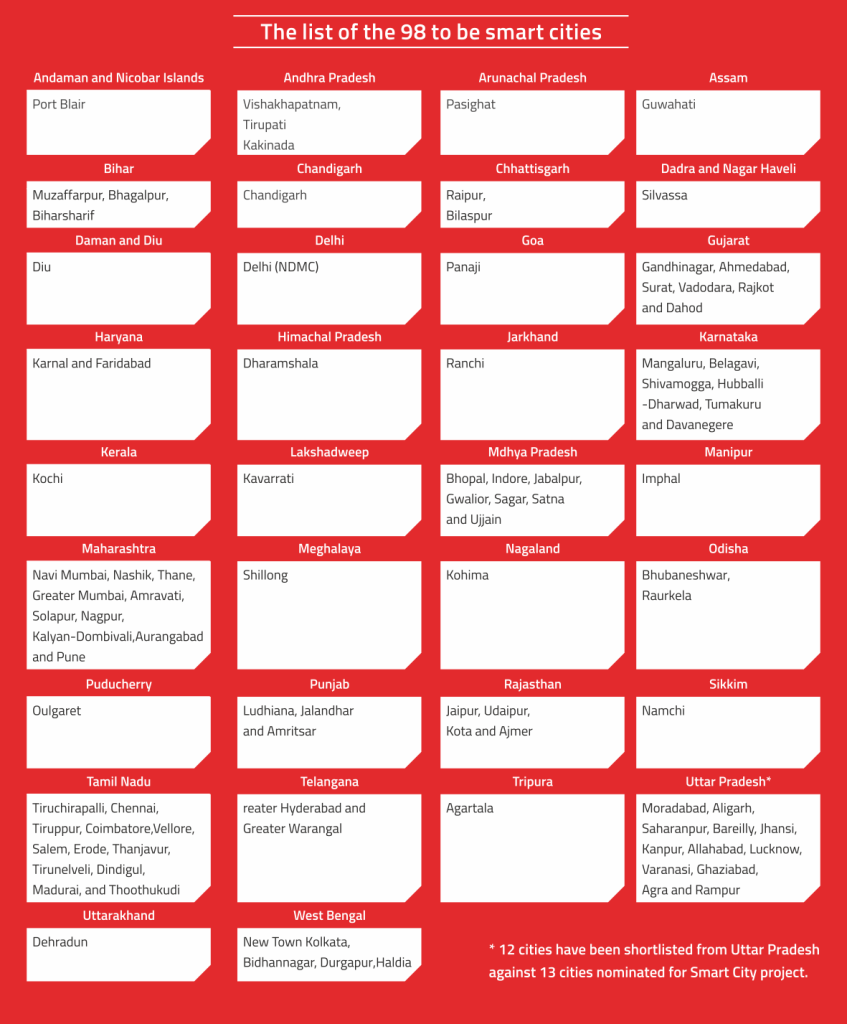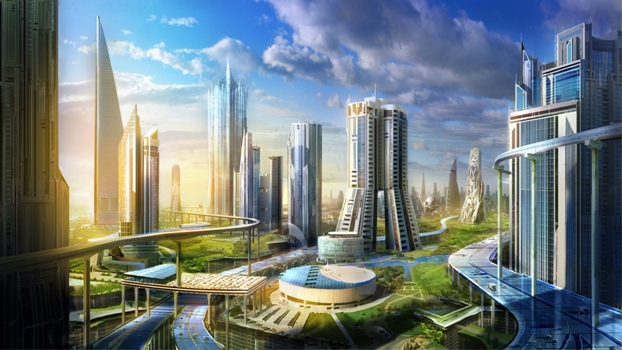 After going through the list, the question that comes in mind of every reader, ‘Are we creating new cities or we will make the existing ones into a new cities?’ For us, Dr. Devendra Kumar Pant, Chief Economist, India Ratings & Research believes selection of smart cities is first step.
He said that major challenge is to provide quality urban services such as 24X7 water supply, sanitation, drainage, solid waste management, sewage treatment. “Looking at finances of urban local bodies, which are far from healthy, provision of these services will be challenging. Levying of user charges to recover cost of provision of these services will be crucial to maintain quality of these services. In the process of smart cities focus should not divert from providing urban services in other cities and make them more livable,” said Dr Pant.
As per the concept note issued by central government, the smart cities will be developed on the four basic pillars. These pillars are – Institutional Infrastructure (including governance), Physical Infrastructure, Social Infrastructure and Economic Infrastructure. The centre of attention for each of these pillars is the citizen. In other words a Smart City works towards ensuring the best for its entire people, regardless of social status, age, income levels, gender, etc.
After going through the list, the question that comes in mind of every reader, ‘Are we creating new cities or we will make the existing ones into a new cities?’ For us, Dr. Devendra Kumar Pant, Chief Economist, India Ratings & Research believes selection of smart cities is first step.
He said that major challenge is to provide quality urban services such as 24X7 water supply, sanitation, drainage, solid waste management, sewage treatment. “Looking at finances of urban local bodies, which are far from healthy, provision of these services will be challenging. Levying of user charges to recover cost of provision of these services will be crucial to maintain quality of these services. In the process of smart cities focus should not divert from providing urban services in other cities and make them more livable,” said Dr Pant.
As per the concept note issued by central government, the smart cities will be developed on the four basic pillars. These pillars are – Institutional Infrastructure (including governance), Physical Infrastructure, Social Infrastructure and Economic Infrastructure. The centre of attention for each of these pillars is the citizen. In other words a Smart City works towards ensuring the best for its entire people, regardless of social status, age, income levels, gender, etc. Smart Cities must be Livable, Likable
Government announces the full list of 98 smart cities
“Smart cities will have the core infrastructure and will give a quality and decent life to citizens. It will enable a clean environment and provide smart solutions to problems,” said Union Minister of Urban Development, Venkaiah Naidu while unveiling the list of 98 cities which will be part of ambition Smart Cities project.
The day is not far when we will start experiencing the smart cities of India. Human being is inborn smart and now he has already made devices very smart. Starting from mobile phones to automobile, many things have been made smart. Now, it’s the time to make our cities ‘Smart’. But does making and providing best infrastructure makes the city smart enough? Does making sky scrapers and providing fastest data downloading speed along with all best amenities makes the city smart? Well the technical definition says a Smart City for its sustainability needs to offer economic activities and employment opportunities to a wide section of its residents, regardless of their level of education, skills or income levels.
A Smart City needs to identify its comparative or unique advantage and core competence in specific areas of economic activities and promote such activities aggressively, by developing the required institutional, physical, social and economic infrastructures for it and attracting investors and professionals to take up such activities. It also needs to support the required skill development for such activities in a big way. This would help a Smart City in developing the required environment for creation of economic activities and employment opportunities.
Many experts including economists, academicians and analysts have a common thought on to-be developed Smart Cities. They believe that the smart cities should not end up becoming yet another expensive real estate project. The new cities should be designed and made such a way that the project must be livable and likable for citizens.
Meanwhile, Central government has earmarked Rs48,000 crore for development of 98 cities. It means, up to Rs500 crore will be spent on every city. Is this amount sufficient to convert the existing cities ‘Smart’? Probably not. As per the new greenfield smart city projects in Gujarat, only trunk infrastructure costs in multiple of rupees thousands of crore. It is anybody’s guess on how and on what government will spend Rs500 crore each to create or convert in to smart cities.
On August 27, 2015, Union Minister of Urban Development, Venkaiah Naidu released a full list of 98 cities which will be converted in to smart cities. These cities include 24 state capitals while Patna and Bengaluru are missing from the list and Uttar Pradesh gets maximum number of cities found space in list of 98 smart cities.
Barring Jammu & Kashmir, all states of the countries are included in the Smart City Mission. J&K has asked from some more time to decide on the potential smart cities of the state. In his speech, Mr Naidu also said that Making cities smart will make them engines of economic growth besides giving decent life to the citizens. “About 13 crore population across 98 cities which is 35% of urban population will be covered under SmartCity Mission. Central government proposes to give financial support to Mission to the extent of Rs48,000 crore over five years. State/UTs & urban local bodies have an important role to play in the implementation of SmartCity Mission,” he said.
 After going through the list, the question that comes in mind of every reader, ‘Are we creating new cities or we will make the existing ones into a new cities?’ For us, Dr. Devendra Kumar Pant, Chief Economist, India Ratings & Research believes selection of smart cities is first step.
He said that major challenge is to provide quality urban services such as 24X7 water supply, sanitation, drainage, solid waste management, sewage treatment. “Looking at finances of urban local bodies, which are far from healthy, provision of these services will be challenging. Levying of user charges to recover cost of provision of these services will be crucial to maintain quality of these services. In the process of smart cities focus should not divert from providing urban services in other cities and make them more livable,” said Dr Pant.
As per the concept note issued by central government, the smart cities will be developed on the four basic pillars. These pillars are – Institutional Infrastructure (including governance), Physical Infrastructure, Social Infrastructure and Economic Infrastructure. The centre of attention for each of these pillars is the citizen. In other words a Smart City works towards ensuring the best for its entire people, regardless of social status, age, income levels, gender, etc.
After going through the list, the question that comes in mind of every reader, ‘Are we creating new cities or we will make the existing ones into a new cities?’ For us, Dr. Devendra Kumar Pant, Chief Economist, India Ratings & Research believes selection of smart cities is first step.
He said that major challenge is to provide quality urban services such as 24X7 water supply, sanitation, drainage, solid waste management, sewage treatment. “Looking at finances of urban local bodies, which are far from healthy, provision of these services will be challenging. Levying of user charges to recover cost of provision of these services will be crucial to maintain quality of these services. In the process of smart cities focus should not divert from providing urban services in other cities and make them more livable,” said Dr Pant.
As per the concept note issued by central government, the smart cities will be developed on the four basic pillars. These pillars are – Institutional Infrastructure (including governance), Physical Infrastructure, Social Infrastructure and Economic Infrastructure. The centre of attention for each of these pillars is the citizen. In other words a Smart City works towards ensuring the best for its entire people, regardless of social status, age, income levels, gender, etc.
 After going through the list, the question that comes in mind of every reader, ‘Are we creating new cities or we will make the existing ones into a new cities?’ For us, Dr. Devendra Kumar Pant, Chief Economist, India Ratings & Research believes selection of smart cities is first step.
He said that major challenge is to provide quality urban services such as 24X7 water supply, sanitation, drainage, solid waste management, sewage treatment. “Looking at finances of urban local bodies, which are far from healthy, provision of these services will be challenging. Levying of user charges to recover cost of provision of these services will be crucial to maintain quality of these services. In the process of smart cities focus should not divert from providing urban services in other cities and make them more livable,” said Dr Pant.
As per the concept note issued by central government, the smart cities will be developed on the four basic pillars. These pillars are – Institutional Infrastructure (including governance), Physical Infrastructure, Social Infrastructure and Economic Infrastructure. The centre of attention for each of these pillars is the citizen. In other words a Smart City works towards ensuring the best for its entire people, regardless of social status, age, income levels, gender, etc.
After going through the list, the question that comes in mind of every reader, ‘Are we creating new cities or we will make the existing ones into a new cities?’ For us, Dr. Devendra Kumar Pant, Chief Economist, India Ratings & Research believes selection of smart cities is first step.
He said that major challenge is to provide quality urban services such as 24X7 water supply, sanitation, drainage, solid waste management, sewage treatment. “Looking at finances of urban local bodies, which are far from healthy, provision of these services will be challenging. Levying of user charges to recover cost of provision of these services will be crucial to maintain quality of these services. In the process of smart cities focus should not divert from providing urban services in other cities and make them more livable,” said Dr Pant.
As per the concept note issued by central government, the smart cities will be developed on the four basic pillars. These pillars are – Institutional Infrastructure (including governance), Physical Infrastructure, Social Infrastructure and Economic Infrastructure. The centre of attention for each of these pillars is the citizen. In other words a Smart City works towards ensuring the best for its entire people, regardless of social status, age, income levels, gender, etc. 















